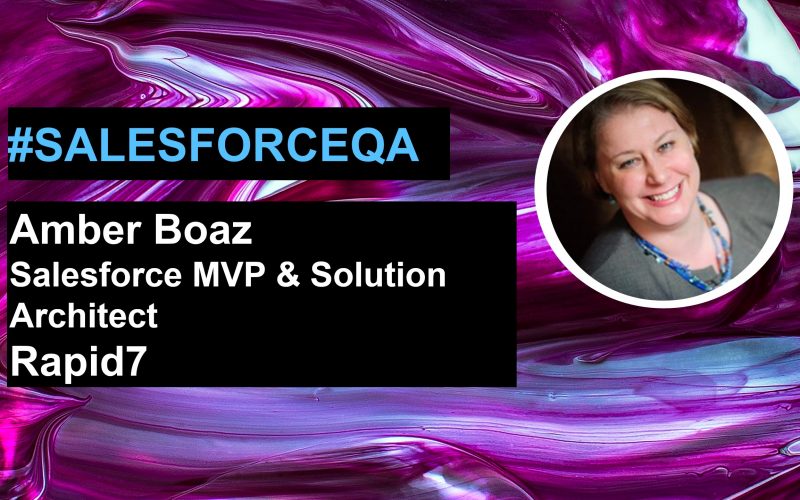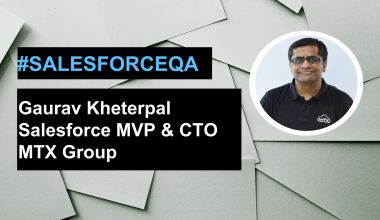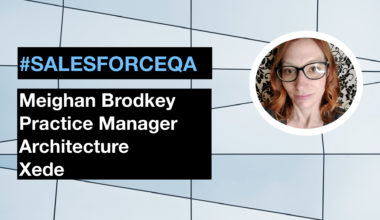In our most recent #SalesforceQA interview, we caught up with Salesforce Solution Architect at Rapid7 and Salesforce MVP, Amber Boaz. Amber talks about the challenges she has faced throughout her career as a woman in tech, as well as the importance of the Salesforce ecosystem to improving diversity and inclusion in the industry.
Amber also discusses the key traits needed to succeed as a Solutions Architect and the emerging trends she is most excited about.
Salesforce Republic (SR): To kick off, could you tell us a bit about your background and how you got to where you are today?
Amber Boaz (AB): We got our first computer when I was five years old and I was fascinated by it. I learned to type on Word for MS DOS, and I just loved technology. I was the only girl in my college dorm with a computer. I fell into the Salesforce world, in 2008, when I was running the call centre for a start-up, and we needed a new CRM. We settled on Salesforce and I was part of the project team to roll it out. I attended the admin 201 training and completely fell in love, and I’ve been in this world ever since.
I’ve worked for quite a few companies within the ecosystem. I stayed at the start-up for a while, then worked for a bigger company and eventually moved into consulting. I did Salesforce consulting for non-profits, local consulting as well as working for a consulting firm that builds AppExchange packages for companies. Moving back into the customer side of Salesforce, I now work for a company where I own all of Salesforce, we have a big development team and around 1,100 users and we are expanding our footprint everyday which is really exciting.
SR: As a woman in tech, what are some of the challenges you have faced throughout your career in the industry?
AB: The biggest one is often being the only woman in the room. I have a pretty big personality which I think has helped me to overcome this challenge, but I’m very cognizant of the fact that that’s unique, not everybody has my personality. In addition to this, as I have aged, I have become willing to stake my claim in a meeting and state my point. Part of my job, because of my experience, is to help bring up those who either are more junior to me, or who don’t have that type of personality and need to develop those skills. To encourage, coach, and to an extent, mentor. It’s about finding your crowd, if you will, and being there for each other. Either literally in the room where the meeting is happening, or before or after the fact.
SR: Would you say that mentorship is a key initiative towards getting more women involved in the industry? Or is the key helping women already in the industry become more confident in their role?
AB: Whilst I think it’s both of those things, I don’t necessarily think formal mentorship is the way to go. My ‘mentors’ – they might not even know that they are my mentors – are people I bounce ideas off. They help me to run through my ideas and identify any issues. It’s less of an official mentorship with set times and meeting agendas, and more about having a support system you can go to when you need advice.
SR: What advice do you have for other women looking to succeed in the Salesforce ecosystem, or in tech in general?
AB: Find that support system. The Trailblazer community is a great way to do that. Every form of social media; LinkedIn, Facebook, Reddit, also has some form of Salesforce presence that you can connect with. Based on your preferences, you can go and find those people who resonate with you. Whilst you might not click with everyone, I’m well aware that I’m not everybody’s cup of tea, find those people you can call on a Tuesday night to talk about something. Find your crowd.
SR: As a Salesforce MVP, in your opinion, how important is the Salesforce ecosystem to improving diversity and inclusion in the industry?
AB: Salesforce is very much leading the way in having the conversation. I don’t have statistics around how Salesforce as a company or a community is doing, but my anecdotal evidence tells me that those difficult conversations are happening. We’re attempting to heal generation old-wounds, and whilst we might not be making as much progress as we should, we are making progress. Salesforce has offered a space and a language to have those conversations that other tech companies either have been unwilling or unable to do. The Trailblazer community is a place where people can be vulnerable and ask questions. That is powerful and builds relationships. When you’ve built those relationships, and there’s trust there, you can then have those harder conversations around inclusion within the industry.
For me, there was a lot of power in going to Dreamforce or a user group meeting and saying, ‘I don’t know, can someone help me to understand?’ Technology is not known, in general, for its willingness to be kind, there’s this prevailing persona of the ‘dudebro’ but that’s not what we have in the Salesforce world, and I really relish that.
SR: As an experienced Salesforce Solutions Architect, what do you think are they key traits to succeed in this role?
AB: A solution architect is about 50% the technology and 50% the people. The hardest part about what I do is not the bits and bytes and typing and clicking, it’s the change management. There can be a lot of anxiety for people changing from processes they have lived and breathed every day to something new. Being able to meet with users and talk them through the process in a way that calms their nerves and gets them excited to make that change is important.
Whether it’s a 50/50 split of technical ability and people skills depends on the project and the people. If you’re automating something that a lower level employee has been doing for 12 years for example, that’s going to be harder than working with a VP of sales at a tech company because the personalities are different. Part of the role is also being able to read the room and deal with those different personalities. There is no one right way to do this and that’s why it’s hard. But a lot of it comes with experience.
SR: You have multiple Salesforce certifications, do you think these are essential to succeed in Salesforce, specifically in a Solution Architect role?
AB: Certifications aren’t required to become a good solution architect. But if you are coming from a non-technical background, certifications do provide a basis for the technical side; the part that’s ‘trainable’ if you will. With that said, I wouldn’t necessarily hire someone with 11 certifications over a person with a solid foundation in the platform and amazing people skills. Certifications serve a very singular purpose; do you know how the system works. They may open doors for you, but you still need to be in the room, command the audience and ask the right questions.
SR: Finally, what emerging trends are you most excited about?
AB: There are two things I’m excited about. Whilst Lightning is not emerging anymore, there are still things happening that are really exciting; dynamic form, low code. We’re talking about citizen IT in a way that we couldn’t in the past. Giving business users the ability to make changes to their workflow, without continuous deployment and continuous integration. Back in the day, someone at Salesforce, possibly Shannon Hale as she’s amazing, talked about moving the declarative cliff so that you don’t have to be a coder. Allowing you to impact your workflow in a way that doesn’t require the heavy lifting. Attempting to balance that with people potentially causing disruptions within the workflow is exciting.
The other thing is AI. There’s already so much there and there’s more coming. There’s going to be some cool things, I don’t know what they are yet, but I can’t wait to be involved.
To follow Amber’s Salesforce journey, check out her Twitter: @amber9904
If you’re a Salesforce professional and would like to be involved in our Q&A series, please get in touch today!


